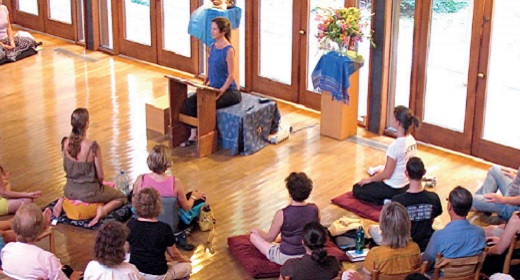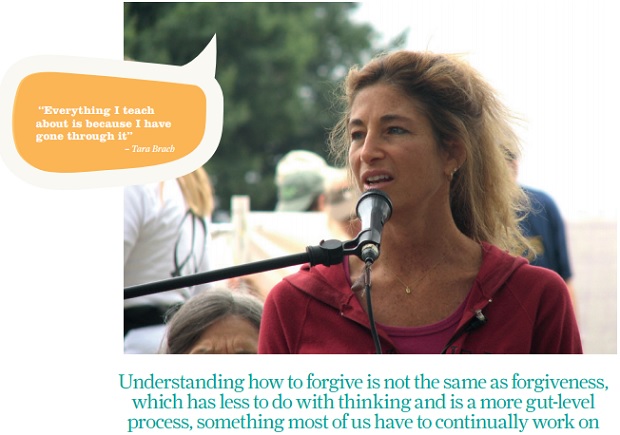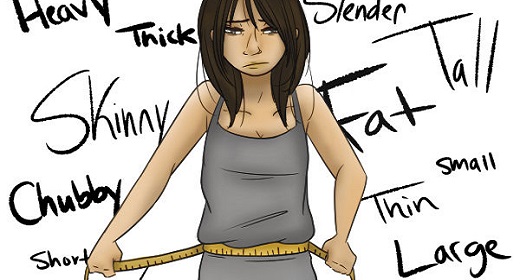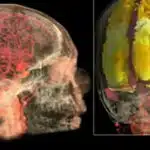Tej Rae talks to Buddhist meditation leader, psychotherapist and author Tara Brach about how to wake up from ‘the trance of unworthiness’…
‘Your failure to know joy is a direct reflection of your inability to forgive’ — Charlotte Joko Beck, an American Zen teacher and author
There are those we forgive easily – our children, for licking maple syrup directly from the plate – and those with whom, try as we might, we cannot find peace. Our fathers. Ex-wives. Governments that have done harm to our people. We carry these fractious experiences around with us, and depending on the depth and breadth of the fissure, they have a way of infiltrating our days: the way we raise our children; the way we talk to our gardeners; or our bosses. Buddhist meditation teacher, psychotherapist and author Tara Brach helps others to find peace and clarity, and her teachings on forgiveness are central to the work she does. I found Tara through her podcasts. Some refer to her hour-long podcasts as ‘free therapy’. She references Buddhist texts, poetry, classic and contemporary literature, current events and fables from world cultures. What drew me in, of all things, was her use of poetry. It’s easy to seamlessly blend Buddhism and psychotherapy, but when you add Mary Oliver and Rumi and the legends of Sir Gawain to the mix, you’ve got my full attention. Tara founded the Insight Meditation Centre in Washington, DC, and leads guided meditation sessions there every Wednesday evening.
The night I met her for an interview, it was difficult to find a parking space at the leafy Unitarian church that hosts the event. For an unusually temperate Wednesday night in the summer, when local residents might frequent an outdoor café or take a walk by the Potomac, the place was full to capacity. Inside the church, blonde wood and a balcony set off a crowd of all ages — high school students and grandmothers, the hearing impaired, and one college student in a wheelchair who breathed through a ventilator. While Tara touched base individually with members of the group, I positioned myself on a wooden step to wait for her, next to a man whose T-shirt said: Eat Kale.
Tonight, her disembodied voice, so familiar over the Internet, a voice as intimate as it is expansive, was about to be made real. (Nor am I the first interviewer to meet Tara in person and marvel at this shift from ghost to human, the diaphanous made solid.) It is the voice of someone who knows herself. And later, when we had a chance to talk, I noticed my voice changed too, picking up a certain quality of her peace. In person, she is a slight woman, long hair dropping straight down her back, in extremely comfortable shoes. Intentionally unintimidating. When she came over, she gave me a strong hug, scented with a heady natural oil. Forgiveness is a territory Tara knows intimately, and one of the driving forces to write her first book, Radical Acceptance. “Individually or as a cultural group, all of us have been wounded, and all of us close our hearts to other people,” she recognises. As a young woman, she lived in a spiritual community after college.
Her days were split between pursuing a doctorate in clinical psychology and teaching yoga and meditation at the ashram. She married another member of the spiritual community, and became pregnant, but suffered a miscarriage. Following her loss, the leader of the community, a man she had known for a decade, singled her out during a meditation session. In front of the group, he told her she had caused her baby’s death by being “professionally ambitious and ego centered”. The humiliation of this event shook her as she realised that not only would she have to cut ties with him, but also leave the community that had become her family.
It was a painful time, but one that led to the gestation of her life’s work. While her circumstances might be extreme, many of us recognise ourselves in the elements of her story, as well as how difficult it is to move past a sense of revenge and anger when something like this happens. “Vengeance is a lazy form of grief,” she quotes on the night we met, a phrase from the movie The Interpreter. “It’s part of our nature when we’re hurt — to form a scab. But if you live with a scab, you don’t ever get to really heal.” By sharing such an intimate story, in her book and talks, Tara creates a safe space that allows others to be vulnerable as well. “Everything I teach about is because I have gone through it,” she says. Healing begins when you find a way to empathise with the person you are struggling to forgive.
She offered this metaphor as a way to shift perspective: Imagine you are walking in the woods, and you see a little dog under a tree. You are about to go pet it, but the dog lurches at you and its fangs are bared, so you go from wanting to pet the dog to feeling angry at it because it’s going to attack you. Then you see the dog’s leg is in a trap, and your feelings change again, to concern for the dog. Tara explains, “When somebody does something hurtful, in some way, they’re suffering. If you can begin to look at another person and see behind the mask to the vulnerability that’s there, that their violence is coming from some deep wound, that their way of behaving that feels hurtful comes because they were hurt. If we can see that, our hearts will open to them. We have to be willing to look.”
Understanding how to forgive is not the same as forgiveness, which has less to do with thinking and is a more gut-level process, something most of us have to continually work on. The way to access this is the basis for Radical Acceptance, which she wrote in 2003. The term means “the process of accepting our actual, presentmoment experience. Clearly recognising what is happening inside us, and regarding what we see with an open, kind and loving heart”. The ‘Radical’ part is derived from the Latin word radix, meaning going to the root or origin, so Radical Acceptance enables us to return to the root or origin of who we are, to the source of our being. “If we are at war with ourselves,” Tara explains, “that feeling of not ok or not enough prevents us from filling our hearts, feeling creative, taking risks. I see this leads people to addiction when it creates so much anxiety that people try to stuff it with food, or overworking, or drugs. It’s a pervasive suffering.” She calls it the trance of unworthiness, and her Zen koans and poetry excerpts and guided seated or standing or walking meditations are selected for the purpose of helping listeners wake up from the trance.
 “I get a lot of feedback from people committing themselves to become more true to themselves, to stop making war on themselves. When they stop judging themselves, they become more accepting of others. In a visceral way, not just an abstract way. It’s not, Oh I get it! It’s a life process,” she recalls. Acceptance, by its very nature, is often confused by passivity. Should I accept myself as lazy? Abusive? If I accept the darker side of myself, will it overtake the rest? Tara dedicates much of her work to clarifying this distinction. “Unconditional acceptance of this moment’s experience does NOT mean that we are being passive or condoning harmful behaviour. Acceptance is an honest acknowledgement of the truth of what is happening here. By accepting the reality that is here and now, we are able to respond in ways that draw on our inner courage, intelligence and compassion. It cuts to the root by acknowledging reality and connecting us with our deepest, most wise and loving self.” While she was writing Radical Acceptance, America was preparing to invade Iraq.
“I get a lot of feedback from people committing themselves to become more true to themselves, to stop making war on themselves. When they stop judging themselves, they become more accepting of others. In a visceral way, not just an abstract way. It’s not, Oh I get it! It’s a life process,” she recalls. Acceptance, by its very nature, is often confused by passivity. Should I accept myself as lazy? Abusive? If I accept the darker side of myself, will it overtake the rest? Tara dedicates much of her work to clarifying this distinction. “Unconditional acceptance of this moment’s experience does NOT mean that we are being passive or condoning harmful behaviour. Acceptance is an honest acknowledgement of the truth of what is happening here. By accepting the reality that is here and now, we are able to respond in ways that draw on our inner courage, intelligence and compassion. It cuts to the root by acknowledging reality and connecting us with our deepest, most wise and loving self.” While she was writing Radical Acceptance, America was preparing to invade Iraq.
The surface contradiction between her teachings and her distress about war led to a deep reflection about what Radical Acceptance meant in a political arena. “I asked myself, what does it mean to bring Radical Acceptance to the feeling of outrage I was experiencing as this country moved towards war? I was present and non-judging with the feeling and I found under my outrage was fear. I was afraid for the cycling of more violence. And by bringing mindful presence to the fear, underneath that, I found caring. When I joined anti-war demonstrations, it wasn’t from an arm-flailing place of I hate the administration. It was from a place of caring, for the Iraqi children and their parents, for the young Americans who were going to lose their lives in the war, for all who would suffer.” Then, she got arrested.
With a small group that included Nobel laureates Mairead Corrigan and Jody Williams, Tara was put in a paddy-wagon and spent the day in prison. The meditative work she did to contact and accept her feelings enabled her to be politically engaged in a way that resonated with her values. “We can be activists in this world,” she proclaims, “stand up for what we believe, speak truth to power, but the ground has to be presence. Otherwise, we’ll be acting from anger and create ripples of violence.” When opposing parties listen to each other, and recognise the humanity in the other, the cycle is interrupted. The same holds true for conflicts on a smaller scale. For one woman with her father, the pattern of anger and a closed heart had been going on for decades. She couldn’t forgive him for being such a judgmental and neglectful father. As he aged, his critical edge softened but she couldn’t shake the deep anger she felt towards him. When she and Tara met to explore how meditation might help her open her heart, Tara encouraged her to first bring self-compassion to the life long feelings of hurt, to her grief at not having the father she had armour. Forgiving him is one of the great blessings in my life.”
Tara emphasises that forgiveness is a gradual, emotional process; not something the mind takes on alone. When we’ve been wounded, we can’t just decide that we “should” forgive the other person. The first step is to bring a compassionate attention to our own heart. Once we have held ourselves with kindness, it is possible to widen the circle of compassion to include others. “You can’t will forgiveness, all you can do is be willing,” Tara counsels, “Once you have the intention, everything else follows.”




















































